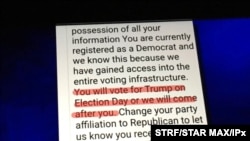What the FBI and national intelligence officials described as fake “Proud Boys” emails targeting voters in Florida and several other states came in waves on Tuesday.
Several University of Florida students reported receiving them beginning in the morning, according to local media reports.
Bennett Ragan, a recent University of Florida graduate, said in an interview with VOA that the email hit his spam box twice, the first at 3 p.m. and the second at 5 p.m.
Ragan, the campaign manager for a candidate for the Florida state legislature from the Gainesville area, shared a copy of the email with VOA.
The email came from info@officialproudboys.com — a domain previously owned by the Proud Boys, a far-right group that backs President Donald Trump’s reelection but has denied any involved with the controversial message.
On the social media platform Parler, Enrique Tarrio, the Proud Boys leader, denied his group was behind the threatening operation. Tarrio did not answer a call from VOA.
Under the subject line “Vote for Trump or else!” the email sender claimed to know Ragan was a registered Democrat and pressed him to switch party affiliation and vote for Trump.
“You will vote for Trump on Election Day or we will come after you,” the email read. “Change your party affiliation to Republican to let us know you received our message and will comply. We will know which candidate you voted for. I would take this seriously if I were you … good luck."
Another person on the staff of Ragan’s boss, Florida State House candidate Kayser Enneking, received the same email, Ragan said, as did at least a dozen friends and acquaintances in Florida.
At first, Ragan said, he and others didn’t make much of it.
Part of a larger effort
“It was one of those things that we said, ‘Well, you know, it's odd,’” Ragan recalled in an interview. “These are things that we've seen, unfortunately pretty often by bad actors seeking to influence elections through these means.”
But as others in Florida and at least three other states – Alaska, Arizona and Pennsylvania – reported receiving similar messages Tuesday, it became apparent this was part of a larger effort.
The effort was a cyber campaign by Iran to intimidate U.S. voters using publicly available voter records, FBI Director Christopher Wray and John Ratcliffe, the director of national intelligence, disclosed late Wednesday.
Iran and Russia have obtained American voter registration data, the officials said. Iran has used “spoofed” emails to intimidate voters, Ratcliffe said. Iran’s foreign ministry rejected the U.S. accusations as “baseless.”
Democratic voters in Florida appear to have been the main target of the spoofing attack, though their exact number remains unclear.
The Lawyers’ Committee for Civil Rights said it had received more than 100 complaints about the message. In Alaska, several Democratic voters reported receiving the email, while in Arizona and Pennsylvania only one voter each reported being targeted.
The motive behind the campaign remains unclear.
Ratcliffe said that the campaign was designed in part to hurt President Donald Trump, apparently by insinuating a tie between Trump and the Proud Boys.
The Proud Boys describe themselves as a drinking club of “western chauvinists.” But extremism watchdogs say that is a guise for what is at its core a misogynistic, anti-Muslim and anti-immigrant group.
The extremist outfit was thrust into the national spotlight when Trump, during the first presidential debate last month, exhorted them to “stand back and stand by,” after being challenged by Democratic challenger Joe Biden to disavow them. Trump later walked back his comments, saying he denounced all forms of white supremacy.
Jesse Littlewood, vice president of Common Cause, a government watchdog, took issue with Ratcliffe’s assertion that the allegedly Iranian-backed email campaign was aimed at hurting Trump.
Voter rolls public information
“My understanding from looking at these emails is that they were intimidation focused on encouraging people to reregister as Republicans and to vote for President Trump,” Littlewood said in an interview with VOA.
While some voters may have found the emails intimidating, Littlewood said the effort was primarily a disinformation campaign designed to sow chaos and confusion ahead of the Nov. 3 presidential election.
“It's much cheaper to do this kind of activity than it is to actually hack the systems which they know there's no evidence they actually did,” Littlewood said.
Voter rolls are public information and readily available in the U.S. Candidates, campaigns and, increasingly, civic groups use them to reach out to voters.
Most U.S. states including Alaska and Florida allow anyone to request a copy of the state voter rolls. In Arizona and Pennsylvania, they’re available for public inspection, according to the National Conference of State Legislatures.
"It is important to note that much of the information reportedly utilized for this targeted email intimidation is available publicly,” Arizona’s secretary of state, Katie Hobbs, said in a statement to VOA. “Now, more than ever, we must rely on trusted sources of election information.”
Arizona does not publish voters’ email addresses, and a spokeswoman for Hobbs said it is possible that the orchestrators of the email obtained the sole Arizona voter’s email address from a commercial list.
In Florida, the schemers apparently relied on the 2018 voter rolls, according to Ragan.
“I knew that because they had a previous address of mine and the previous addresses of a number of my colleagues and acquaintances, Ragan said.
But while voter records are publicly available, how a voter votes remains secret. Not even election officials can find out who a given voter votes for, Littlewood noted.
What’s more, no voting systems were compromised as part of the disinformation campaign.
“I personally believe that the election systems are very secure, and I think our officials that are in charge of elections are some of the most nonpartisan and devoted public servants that we have, Enneking, an anesthesiologist who is running for a seat in Florida’s State House, said in an interview.




